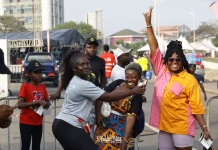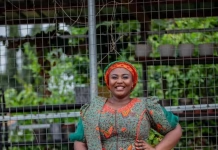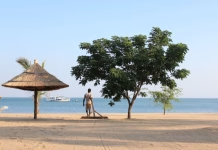
The opposition National Democratic Congress (NDC) on December 31, 2022, celebrated the 41st anniversary of the 31st December Revolution at Dawhenya in the Greater Accra Region.
It was characterised by the lighting of the perpetual flame, laying of wreaths and durbar.
The commemoration was under the theme, “31st December Revolution, remembering our heroes for greater works”.
31st December Revolution is celebrated every year to remind NDC members of the ideals upon which the 4th Republic was established [probity, accountability, freedom and justice].
Present at the durbar grounds includes the National Chairman of the NDC, Johnson Asiedu Nketiah, Member of Parliament for Korle Klottey constituency, Dr. Zanetor Agyemang Rawlings, the NDC running mate in the 2020 presidential election, Professor Naana Jane Opoku-Agyemang, among others.
Others present were Member of Parliament for Ningo Prampram, Sam Nartey George, Fifi Fiavi Kwetey, General Secretary of NDC, a former Mayor of Kumasi who is also NDC flagbearer hopeful, Kojo Bonsu, a former Minister of Finance and flagbearer hopeful, some traditional authorities amongst others.
Speaking at the event, the General Secretary of NDC, Fifi Fiavi Kwetey, said the NDC must set principles that will forever help the country.
“This party must come back to the Bedrock of principles and values. This party must fundamentally be a party that loves this country enough to make sure the principles we set will forever help this country,” Mr. Kwetey said.
Background
On the right walls of a living-room in a family home at Medina once hung a group portrait with a sternly-looking young boy in a traditionally-woven jumper shirt perching on the laps of a fatherly-looking uncle. The coloured-looking boy known by his youthful friends as Jeremiah Mackenzie was later to be known and called Flt-Lt Jerry John Rawlings- whose arrest, detention and release over alleged coup plot of 15 May 1979 was to become Ghana’s youngest head of state on 4 June 1979. And yes, if the country’s constitution were to be well guided, might wield this historical but circumstantial and enviable position forever
Jerry was brought to world on Sunday, 22 June 1947, by Madam Victoria Agbotui and the said Scottish pharmacist James Ramsay John. He hardly showed kindness to the Gold Coaster and her son but the fortunes of Gold Coast ancestors never deserted them. Little John made it to the prestigious Achimota School in Accra, where the then adherent to Catholic Rituals and Chorister, whose youthful dream centred on pasturing and soldiering, successfully obtained his GCE O-Level in 1966. He was to be enlisted into the Ghana Air Force in August 1967 and eventually, marched on to Ghana Military Academy and Training School in Teshie, coming out in January 1969 with the “Speed Bird Trophy” for best Cadet in flying and Airmanship.
Those who have either lived or worked with Rawlings describe him as compassionate, good listener and charming individual who could easily make friends and attract to his personality a host of unconscious sympathizers, admirers and well-wishes. But besides this unique charisma and compassion lies Rawlings’ weaknesses. His half-heartedness and robustness towards the very people that he attracts sway them in the same way they come to know him. Rawlings, it seems, inadvertently, suffers peculiar impulse that makes him a personality to gain enduring trust unless one were to adapt to his indispensability. Not even the “oppressed poor” that he cares so much, could escape Rawlings’ stringent benchmarks.
In 1982, I had the opportunity of listening to Flt-Lt Rawlings face-to-face at the Agona Swedru Sports Stadium. It is unclear whether this was the very place where some decades later, he coincidentally, declared the then Vice-President Fiifi Atta Mills as his chosen successor to lead his National Democratic Congress (NDC) which he founded at the crow of multi-party democracy in 1992. Rawlings’ message in 1982 oscillated around what could have appeared to the reader as his worries about the exploited desires of the Ghanaian in subscribing for example, to foreign-invented cake, best loved by the peoples of the Western- Central, as against perhaps its composite product, such as abodoo, being made in the Volta.
As a youth the imports of that sermon changed my ignorant perception about the then routinely debated topic such as the impacts of “military intervention in African politics” of which the ‘yentua syndromes of the Kutu Acheampongs, Mombutu Sesesekos and the Idi Amins, had hitherto, offered empirical baseline in marshalling in all-force, against all forms of usurpation of peoples’ power through the barrel of the gun that our country, had been a constant victim. On 24 February 1966, Ghana experienced his first devastating successful military coup where her first Primer and President- Dr Kwame Nkrumah, on the pretext of human rights abuses and failing national economy, was kicked out from political office.
The Evolution of the 31 December Revolution- which by all logical conclusion is the unfinished destination of the life and works of Rawlings and the June 4 Uprising which I take up the challenge to document, is motivated by passion for history rather than contemplation of any past obligations or future promises….
Readers could watch out for the full Book- about to be launched in the shortest possible time…
Credit: The OmanbaPa Research Group


















